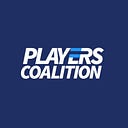Retired Softball Star Lauren Chamberlain Talks Gender Wage Gap in Sports, Allyship and Uncomfortable Conversations
By Players Coalition
Earlier this month, Players Coalition had the opportunity to sit down with former professional softball player and entrepreneur Lauren Chamberlain to discuss advocacy, activism, and some of the discrimination faced by female athletes.
The conversation took place just days after the NCAA found itself in hot water for providing women’s basketball players with training facilities inferior to the male athletes during the Division 1 tournaments.
Chamberlain experienced her fair share of unequal treatment as a female athlete. She said the first time she noticed it was when, as a child, she saw the girl softball players were provided with inferior equipment to the boys. She saw these disparities throughout college, and again as a professional athlete — most impactfully in the form of pay inequality. “Being paid what you’re worth was definitely a prevalent topic in my career,” says Chamberlain, who was the number one pick in the 2015 NPF draft. The average female softball player makes just $6,000 per year, in comparison to the average professional baseball player salary of $4,000,000. This is an even more stark difference than the average wage gap between men and women, with most women making just 60 cents for every dollar their male counterparts make for doing the exact same job.
“If you support women, say it loud and proud and don’t wait for the camera to be on,” Chamberlain says on the importance of male athletes, and men working in the front offices of teams, speaking up about the treatment of female athletes. She also thinks being open to being educated is important. “I think furthering the conversations, and not shying away from uncomfortable conversations is important,” says the former Oklahoma Sooner.
This is a lesson Chamberlain learned first-hand during her time as a student and infielder with the Sooners. Chamberlain was dating a Black football player at the school at the time. A fraternity with mostly white members had recently openly made racist and violent comments towards the players who were demanding those students be held accountable and expelled. Some Black students on campus organized a rally, and though Lauren supported their cause, she decided not to attend. “They don’t want me there,” she thought. Only later, her boyfriend expressed to her his disappointment that she wasn’t present. The experience served as an aha moment for her.
“I will never again not show up,” says Chamberlain. “Even if I’m uncomfortable. Even if I don’t know everything, or if something doesn’t directly impact me, I’m still absolutely going to show up and be an ally.”
Over the last few years, I’ve learned so much and now I really see that this is systemic. This is running through so much deeper than people think it is.”
Chamberlain understands that part of her using her privilege to be an ally means having uncomfortable conversations with other white people to try to both educate them and hold them accountable for their thoughts and actions when it comes to race and racism. She described to Players Coalition a situation that happened in the summer of 2020 when one of her white former teammates didn’t understand why other players on the team wanted to sit out a game to support the Black Lives Matter Movement and acknowledge the deaths of Breonna Taylor and George Floyd.
“[My former teammate and I] had a really deep conversation that lasted almost 45 minutes,” says Chamberlain. “We went back and forth. It almost felt like we were in the ring. At the very end, she sat back and was like, ‘Alright, I hear what you’re saying.’
That former teammate texted Chamberlain less than an hour later and said she saw the importance of sitting out and thanked Chamberlain for having the conversation with her. “There’ve been a lot of heavy conversations like that with people I love that hopefully got them to change their mind a little bit on certain topics.”
When it comes to her activism and allyship, Chamberlain says she’s all in. “I’m not on the sidelines anymore. It’s our fight. Let’s go.
Players Coalition is structured as an independent 501(c)(3) (charity) and 501(c)(4) (advocacy) organization, working with professional athletes, coaches and owners across leagues to improve social justice and racial equality in our country.
